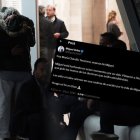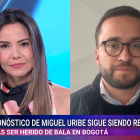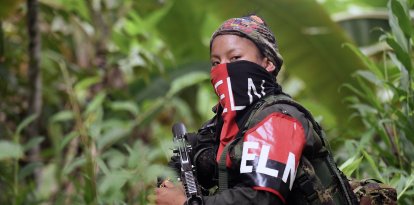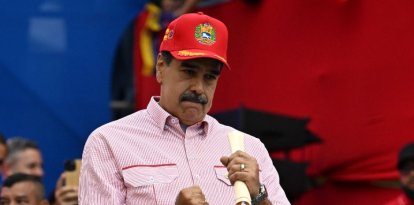Colombia: Petro claims Miguel Uribe's security detail was 'strangely' reduced before assassination attempt
The lawyer of the shot senator filed a lawsuit against the government agency in charge of the bodyguard and asked the attorney general's office to investigate whether the state had left him defenseless "by omission."

Scene of the shooting of Miguel Uribe.
Colombian President Gustavo Petro reported Monday that Senator Miguel Uribe's security detail was reduced on the same day he was shot three times during an event. On the Saturday of the attack, according to Petro, the team protecting of the opposition presidential candidate had been "strangely reduced" "from seven to people."
The protection of the victim, leader of the Democratic Center party, was in charge of the National Protection Unit (UNP), a body that protects threatened people and high-profile politicians. Its director, Augusto Rodríguez, is a close ally of Petro, and was also a member of the M-19 guerrilla group.
Rodríguez assured that Uribe was protected by three UNP employees and four policemen. According to him, at the time of the attack, "there were fewer people than there should have been" because some of his bodyguards were resting. In addition, he disassociated himself from the logistical coordination. It was the responsibility of one of the policemen, Rodríguez said.
Hours before Petro made his accusations, Uribe's lawyer said he had filed a criminal complaint against Rodríguez, accusing him of ignoring 20 requests to reinforce his client's security since the beginning of the year. The lawyer asked the attorney general's office to open an investigation to "establish whether by omission the state left Uribe defenseless."
Attorney General Luz Adriana Camargo assured that the victim's protection had been as robust as that of any other congressman, and that the senator had not reported any death threats.
Petro: "I know that my head already has a price"
"If not, why are they threatening the children of members of the government and my own children?" he asked. In that sense, he then announced that he had ordered to reinforce the security of the families of officials and opposition politicians. His government also informed that it would do the same with more than 30 candidates.
"I know that my head already has a price from neo-Nazi and non-republican forces, from the nation and abroad," he also wrote in another publication, in the same one in which he criticized the reduction of the senator's security. "They went so far as to ask even the Mossad to carry out an extraction operation."
A "killer kid" with a "conflicted personality"
The suspect is a 15-year-old teenager, captured by Uribe's bodyguard. Before being apprehended, he was shot in the leg, for which he had to undergo surgery before passing through the interrogation room.
According to the attorney general's office, if found guilty, he could spend up to eight years in prison, although, as he is a minor, not in a normal jail. Authorities are analyzing more than 1,000 recordings, including security cameras and cell phones.
On social media, Petro assured that the district government had "identified the conflictive nature of the killer kid," who had been transferred from a local program to a national one.
According to Colombia's Ministry of Equality and Equity, the Jóvenes en Paz program seeks to help Colombians between the ages of 14 and 28 in "the territories with the highest levels of homicides and violence." The program includes a "monetary transfer," which depends on the young person meeting participation requirements.
The Colombian president wrote that according to the information he had received from the program, the detainee had demonstrated "a completely conflicted personality, without the capacity to establish social bonds." "He lasted two months, did not attend any classes, and withdrew voluntarily."
Two hypotheses: Attack against the government, attack against the opposition
The director of the police, General Carlos Triana, reported that the weapon used by the attacker was legally acquired in Arizona. At the moment, it is not known how the Glock, a 9 millimeter semi-automatic pistol, entered Colombia.
Minister of Defense Pedro Sánchez informed that several hypotheses were being considered, and he went into detail on two: that it was a message against Uribe's party or that it was an attempt to "destabilize" the government.
The leader of the Democratic Center, influential former President Álvaro Uribe (2002-2010) maintained on social media that "international intelligence" had "informed him of the preparation of another attempt" against the center. Despite sharing a last name and party, the former president and the senator are not related.
The attack against Uribe is tensing the race for Colombia's presidency, which has just begun amid strong disputes between the left and the opposition seeking to regain power.




























